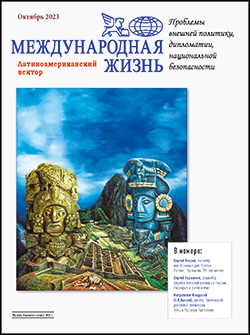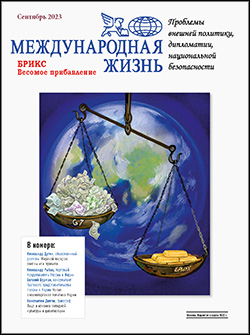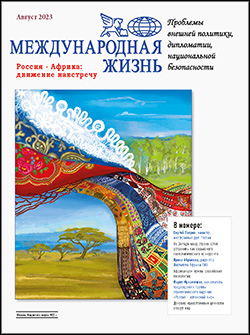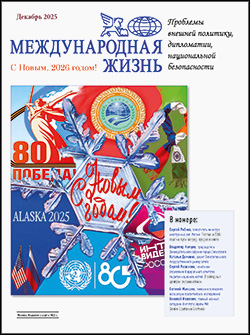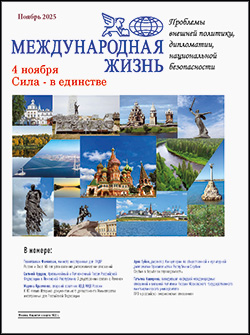Kirill Barsky, Sergey Krasilnikov, Sergey Mikhnevich
Promoting the initiative of the Greater Eurasian Partnership: the convergence of interests of states, business and international institutions
Russia and its EAEU allies see the future Greater Eurasia as a network of regional organizations, national strategies, free trade zones, economic corridors, transport routes, pipelines, digital communications and other transcontinental projects that would develop in a coordinated manner in line with the concept of "integration of integrations" in the interests of regional peace, security and prosperity.
Keywords: Greater Eurasian Partnership, regional integration, Eurasian Economic Union, Eastern Economic Forum, Association of Business Cooperation in Greater Eurasia, mega-regional agreement, free trade zone, Greater Eurasia
Robert Fedorov, Olga Molovtseva
Mutual recognition of professional qualifications while ensuring the freedom of movement of workers in the EU and the EAEU
The distinctive feature of the EAEU from the EU in the framework of the issue considered in this paper is the nature of these communities. While the EU pursues the goal of comprehensive integration, including humanitarian and political vectors, the EAEU focuses exclusively on economic integration. As a result, the EAEU member states do not seek to harmonize the field of education, and in some moments purposefully avoid this issue.
Keywords: EUR, EU, EAEU, freedom of movement of workers, labor market, mutual recognition of qualifications, regulated professions
Yuri Belobrov
About OSCE field missions in the post-Soviet space
As serious shortcomings in the work of the OSCE field structures in the CIS space, we can note the selective increased attention to some countries while ignoring problems in others, the reduction of the Organization's activities to monitoring the situation in the field of human rights and democratic reforms. There are also cases of unjustified criticism by the leadership of field missions of the internal policies of host Governments.
Keywords: OSCE, peace, security, conflicts, post-Soviet space, field missions, mandate, monitoring
Yuri Shafranik
The pandemic has once again demonstrated the need for state intervention in the processes of formation of conditions on the world oil market
Shale hydrocarbons have a huge potential for their development at the appropriate prices and demand for them. And abandoning coal burning is not a prospect for today, because developing countries, especially the poorest, need access to relatively cheap energy to ensure economic growth, reduce the gap with developed economies to eliminate energy poverty.
Keywords: oil market, gasification, solar and wind energy, RES, NPP, ASMM
Armen Oganesyan
Digit plus transhumanism is the last refuge of liberals
A serious threat to foreign policy today is its growing ideologization. Politics is yielding to the pressure of new ideologies. This is due to the change of elites, the coming to power of a new generation of politicians with new values, guidelines and experience. This process increases turbulence due to attempts to decisively break the entire architecture of traditional concepts, criteria and values and force the world to live according to the concepts of postmodern ideology.
Keywords: mass media, social networks, fake news, digitalization
Alexander Bobrov
Three Decades of Modern Russian Foreign Policy
On December 8, 1991, the heads of the three Union republics - the RSFSR, the Ukrainian SSR and the BSSR - signed a document unprecedented in terms of protocol practice and socio-economic consequences for the once unified state, which went down in history as the "Belovezhskaya Agreements", according to which the USSR was declared invalid as "a subject of international law and geopolitical reality".
Keywords: Russia, foreign policy, the collapse of the USSR, the West, democratic transformations
Batyr Niyazliev
The pillars of the Turkmen statehood are independence and neutrality
On September 27, the Turkmen people widely and solemnly celebrated a significant event in their recent history - the 30th anniversary of independence. Speaking about this, President of Turkmenistan Gurbanguly Berdimuhamedov described independence as the basis of all state development, which began the countdown to radical transformations in the socio-political, economic and spiritual life of the country.
Keywords: independence of Turkmenistan, economic reform, bicameral parliament, neutrality, interaction with the Russian Federation
Alex Inozemtsev
Notes of an intourist
Diplomats abroad are certainly subject to the embassy routine. But the main thing is that they study the host countries. Deeply: and the mechanisms of power, and its creators, and politics, and economics, and culture. In general, everything. But sometimes tourists may know more about the particulars. If they are lucky with guides. And also, if they can compare the stories of the guides with their own knowledge. I want to share some of them. Will they suddenly come in handy?
Keywords: intourist's notes, London, Paris, Rome, Madrid, Vienna, Prague
Emir Kusturica
Under the guise of a pandemic, a great "reset" is taking place
The non-synchronicity of the two stories in Russia very often creates a distorted picture. Russia identifies the Serbs with Yugoslavia. And since the collapse of Yugoslavia in 1991, Serbia has been desperately floundering, because "Titoism" was built into its social organism, or rather, the consciousness that was formed in 1948, when Tito said "no" to Stalin. Then, in fact, all those who set the tone in Serbian politics today came to power.
Keywords: Emir Kusturica, Serbia, the great "reset"
Nikolay Kropachev, Konstantin Khudoley
International activity of St. Petersburg State University as an element of the "soft power" of the Russian Federation
The main goal of international activity is to strengthen the position of St. Petersburg State University as a world-class educational and scientific center and to create such a broad and effective system of international relations that would allow St. Petersburg State University to become an influential factor whose position would be taken into account by other higher educational institutions in determining the main directions and trends in the development of the international educational space.
Keywords: Saint Petersburg State University, "soft power" of Russia, public diplomacy, Russian higher school and science, international university rankings, "Petersburg Dialogue", "Russia- Republic of Korea Dialogue", International Forum "Russia and Iberoamerica in a globalizing world"
Valeria Zanina
On the preservation of monuments of Russian culture and history in Uzbekistan
Uzbekistan is a country rich in its traditions, history and culture, which are closely intertwined with the Russian one. The development of this region by the Russian Empire was developed in the 60s of the XIX century, and evidence of a common history can still be found in different parts of the republic.
Keywords: Russian monuments of culture and history, Russian heritage, Uzbekistan, Tashkent, residence of Prince N.K.Romanov, Tashkent and Uzbekistan diocese, Orthodox churches, Cossack settlers
Anna the Great, Semed Semedov
The American-Iranian "second track" of diplomacy
Currently, considerable attention is paid to various instruments of international dialogue, but the "second track" of diplomacy still seems to be insufficiently studied. There is a serious need to comprehend it. The study examines the "second track" of American-Iranian diplomacy, assesses its effectiveness and limitations on its use by both sides.
Keywords: "the second track" of diplomacy, negotiations
Читайте другие материалы журнала «Международная жизнь» на нашем канале Яндекс.Дзен.
Подписывайтесь на наш Telegram – канал: https://t.me/interaffairs

 12:54 20.10.2021 •
12:54 20.10.2021 • 